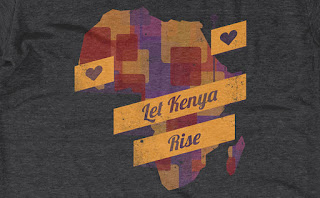I remember so vividly the summer of 2007. I had recently watched my mom leave this world to be with Jesus and had been laboring together with a number of friends to start a coffee shop in downtown Morgantown during a time when ideas like "fair-trade" were just starting to get traction in the US. I was leading out the college and young professionals ministry at Chestnut Ridge Church and had just finished my Master's degree in English at WVU. My friend John Hancox and I had chatted a couple of times about our own passions for social justice and the many great tragedies our generation was witnessing in the world, along with what another mutual friend, Jake Harriman, had been doing since he left the Marine Corps. Jake and I were starting to talk as well, although we were literally about a half-a-world apart. He was doing an internship with an organization called One Acre Fund in southwestern Kenya.
Jake and I had not been in as frequent contact after our undergraduate years, but through technologies like g-chat and Skype, we began to reconnect. He shared a blog he had started to capture some of his experiences in Kenya, and sent a business plan for an idea he had to make a significant impact in fighting extreme poverty called Nuru International. The business plan was the culmination of work of several of his classmates, professors, and friends at Stanford's Graduate School of Business.
During our undergraduate days, there was was a group of us dreaming big dreams about changing the world--the group was much larger than Jake, John, and myself, and amazingly we had all stayed in touch by varying degrees. We had moved forward in our various career paths with passion and a deep desire to make our lives count.
Jake and I had committed to meeting up on Labor Day 2007, to talk in more detail about Nuru, and how it might make sense to work together. We discussed different movements we had grown to appreciate like Invisible Children and ONE, and how they were helping generations move forward in fresh ways to make a difference in the world. We had originally committed to meeting for about an hour, but we ended up meeting all day. Jake, John, and I drove from Morgantown to Hancock Maryland to meet with another board member to discuss the process of taking this idea and making it viable by legally registering as a nonprofit. The day was filled with laughter, dedicated thinking, and meaningful conversation. It was a wonderful reunion among like-minded friends looking to work together to do their part to make the world a better place.
And now, nine years later, many of the ideas discussed back then have moved from abstract concepts to concrete realities. Nuru is no longer just an idea, but an organization filled with dedicated and hard working individuals from around the world who are passionate about seeing the end of extreme poverty. Together, with the support of thousands of supporters in the US and abroad, we have been able to see literally thousands of households in Kenya and Ethiopia take tangible steps to begin lifting themselves out of extreme poverty permanently. When I think back on what has been accomplished, I am filled with joy, and when I look forward I am thrilled about the potential legacy for my soon to arrive child--if we can keep moving forward and building momentum, together, we will see the end of extreme poverty, and a brighter world for everyone!
May we never forget to pause and reflect as we move forward to make the world safer and brighter for everyone!


